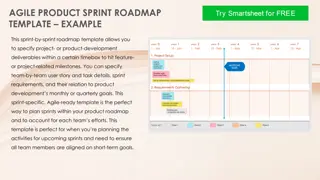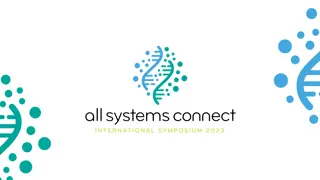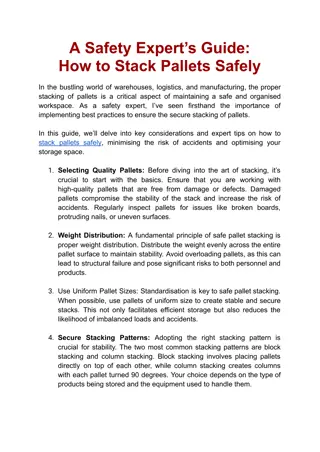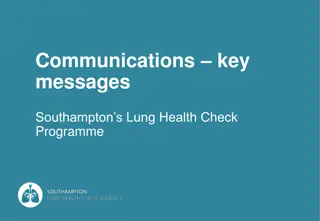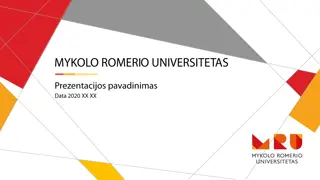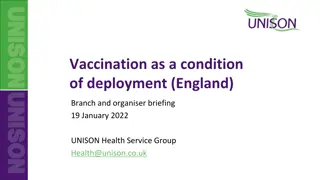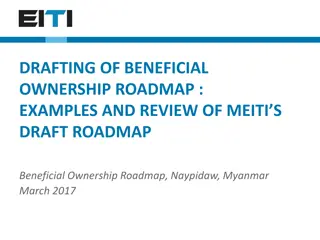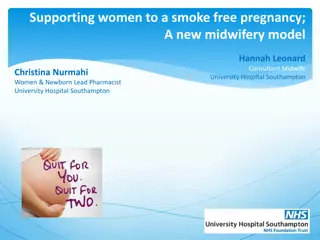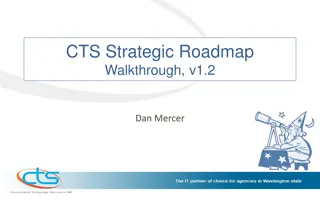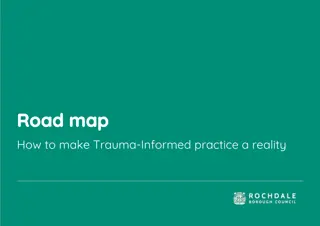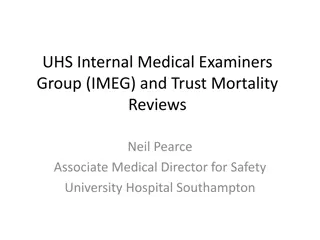Southampton Opening Up Safely: Roadmap Stage 4 Briefing
Dr. Debbie Chase, Director of Public Health in Southampton, discussed the city's approach to safely opening up the economy, focusing on the twin-track Covid-19 vaccination strategy targeting inequality in uptake. Southampton plans to remove social contact limits, reopen all settings, and lift restrictions on life events in Stage 4. The city aims to prevent infection spread by encouraging gradual reduction of measures and promoting individual risk assessment, testing, and vaccination.
Download Presentation

Please find below an Image/Link to download the presentation.
The content on the website is provided AS IS for your information and personal use only. It may not be sold, licensed, or shared on other websites without obtaining consent from the author.If you encounter any issues during the download, it is possible that the publisher has removed the file from their server.
You are allowed to download the files provided on this website for personal or commercial use, subject to the condition that they are used lawfully. All files are the property of their respective owners.
The content on the website is provided AS IS for your information and personal use only. It may not be sold, licensed, or shared on other websites without obtaining consent from the author.
E N D
Presentation Transcript
I Business breakfast briefing opening up the economy safely Southampton 22nd July 2021 Dr Debbie Chase, Director of Public Health Dr Debbie Chase, Director of Public Health
Southampton twin Track Covid-19 Vaccination Approach Track TWO Targeted to address inequality in uptake across ethnicity and deprivation Pop-up clinics in 6 places of worship Outreach in homeless hostels and substance use service Pop-up clinics in community centres in areas of high deprivation and low uptake including Polish Community Centre (Portswood) and Northam Community Centre Multi-faith and multi-cultural vaccine confidence building webinar More community centres and walk-in clinics planned including Ropewalk Community Centre, Hightown and St Mary s Fire Stations Partnership Working bringing strategy, data, communication and insight, engagement, operational and clinical leadership together NHS HIOW & Southampton CCG Southampton City Council PCNs Solent NHS UHS Track ONE General JCVI cohort delivery Local Vaccination Services (PCNs) Vaccination Centres (Oakley Road) (Hospital Vaccination Hub) 2
Roadmap Stage 4 Key Changes Main changes: All remaining limits on social contact (currently 6 people or 2 households indoors, or 30 people outdoors) will be removed All settings will be able to open, including nightclubs Large events, such as music concerts and sporting events can resume without any limits on attendance or social distancing requirements All restrictions on life events will be removed, including the remaining restrictions on the number of attendees There will be no requirement for table service at life events, or restrictions on singing or dancing COVID-status certification will not be required in law as a condition of entry for visitors to any setting The legal requirements to wear a face covering will be lifted in all settings Social distancing rules (2 metres or 1 metre with additional mitigations) will be lifted 3
Roadmap Stage 4 how to mitigate risk How spread of infection can still be prevented in the city: Encourage settings to reduce measures slowly and consider their own risk assessments to guide ongoing requirements for use of face coverings or social distancing especially in light of the prevailing infection rate in the city Encourage residents to consider their own risk and the risk to others in the measures they adopt and to engage with testing and vaccination To continue to promote hand and respiratory hygiene, enhanced cleaning and ventilation, testing when well using lateral flow devices twice weekly or isolate and get a PCR when symptomatic, and to get double vaccinated 4
Roadmap Stage 4 principles supporting reduction in infection risk which will also increase staff and consumer confidence It is important to operate our settings and services in a way that instils confidence in visitors and customers that they are as safe as possible A gradual phased return to the workplace, which may mean that staff continue to work from home in the coming weeks, increasing the time they spend in the workplace slowly A gradual phased relaxation of protective measures: Continued use of face coverings in the workplace where staff move around, when in communal spaces and when meeting people they would not usually meet Limiting mixing with people you would not normally meet by minimising the number, proximity and duration of contacts Maximising ventilation wherever possible Taking part in twice-weekly symptom-free testing Isolating and arranging a PCR test when symptomatic Keeping records of staff attendance in the workplace. Continuation of good hand and respiratory hygiene on a permanent basis Continuation of enhanced cleaning on a permanent basis Individual settings and services may choose to continue specific measures to reduce the risk of infection to staff, to service users and to members of the public. Settings and services may make different choices depending on their risk assessments, which will take account of vulnerable groups, risk of exposure and necessary controls Encouragement of all eligible groups to get vaccinated Showing respect for other people s choices and concerns about COVID-19 risks and protective measures 5
You are not alone, we are here to support you Supporting PHE during significant outbreaks and incidents Webinars for Q/A sessions and general updates (proposed three month pilot of monthly webinar series from September would this be of interest?) Education and training Access to advice via email Teams meeting if required IPC support and visits to premises if required General Health Protection Issues The production of specific infection control and prevention checklists 6
Support from SCC Public Health team to businesses in the city part 2 Tailored Manager/staff briefings or part of monthly webinar series on subject of choice for example: Risk assessments Use of PPE Actions to take and minimising risk Test Trace and Isolate Understanding the importance of vaccination Importance of respiratory etiquette, hand hygiene, ventilation, environmental cleaning For Public Health advice contact publichealth@southampton.gov.uk 7
PHE/DHSC Daily contact testing study Daily contact testing study - GOV.UK (www.gov.uk) How the study works Currently, everyone who s been notified by NHS Test and Trace that they ve been in contact with someone who s tested positive for COVID-19 in England must self-isolate for 10 full days. NHS Test and Trace will invite people who have been traced as a contact to take part in the study, providing they do not have symptoms. The study will compare 2 approaches to routine testing of contacts: participants in the self-isolation group will be given 1 PCR test. They must self-isolate as normal for the full 10-day self-isolation period even if their test result is negative participants in the daily testing group will be given 7 rapid lateral flow tests to test daily. They will be given 24-hour release from self-isolation if the test is negative. They will also receive 2 PCR tests Participants will be placed into study groups at random. 8
Further into the third wave Magnitude and timing of peak in case rate in the city hard to predict virus will find gaps in immunity in those unvaccinated or who have not had recent infection and who continue to mix Disconnect between cases and severe infection, hospitalisation and deaths due to vaccination programme but when case rate very high the pressure on the NHS will still be significant Everything we do across all sectors to reduce transmission can reduce overall peak of infection, offer more time to increase reach of vaccination programme, and preserve business continuity 9
Covid-19 Community Champions Champions are people who live work and learn in the city They are the first to receive the latest updates and guidance from our Public Health team and Stronger Communities Teams The network of Champions is a way to help people in Southampton get clear information on how to stay safe and to be able to share with their friends, families and communities Established in September 2020, we now have over 400 Champions. We communicate via, two weekly email bulletins, Facebook group, WhatsApp broadcast and a weekly virtual forum Next step is to engage with young people aged 13-19 to support their peers and families To find out more information or to register visit: www.southampton.gov.uk/communitychampions 11
Anyone with any of the three main symptoms of high temperature, new continuous cough, or loss of taste or smell (including those who have been fully vaccinated) still required to self-isolate (along with their household) and arrange a PCR test There are lots of ways to access a PCR test in Southampton; Book a test online or by calling 119 Test can be taken at: A local walk-through testing site (Marlborough Rd Car Park Shirley, Woodley Rd Car Park Woolston, Avenue Campus Highfield) Regional drive through site (Southampton Airport) Home test kit PCRs now recommended for all close-contacts at the start of their isolation period but a negative test does not remove the need to complete 10 days of isolation From August 16th a close-contact who is double vaccinated or under 18 years of age will no longer need to isolate but should still arrange a PCR test and isolate if positive
Everyone in England (including those who have been fully vaccinated) continues to be encouraged to undertake twice weekly symptom free testing. There are lots of ways to access symptom free testing in Southampton; Anyone can collect boxes of free home test kits ( Community Collect ) to carry out testing in the comfort of their own home using rapid lateral flow devices (LFD). Collection points have been established across the city. This includes all 40 of Southampton s community pharmacies. A full list can be found on the SCC website or via NHS Site Finder. Home test kits can also be ordered on line for delivery via Royal Mail at: https://www.gov.uk/order-coronavirus-rapid-lateral-flow-tests Those who wish to can still book and access a supervised test from select community pharmacies (see SCC website for details). Local Testing Site (LTS) no longer offer collection during the afternoons. These site have reverted to PCR testing. Anyone that gets a positive test with a LFT must get a confirmatory PCR test. Information, including FAQs, are available on the SCC website.
Why its important that everyone engages in twice weekly testing It will help reduce the number of COVID-19 cases in Southampton Fortunately cases and rates of COVID-19 are at a lower level, but we still need to do everything we can to bring them down further to keep ourselves, our families and our colleagues safe. One in three people with COVID-19 do not have any symptoms, and could be passing it to others without knowing. The more people can identify whether they are carrying COVID-19 infection, and then self- isolate if they are, the better our chance of breaking the chains of transmission and returning to a more normal way of life. It will help us to keep ourselves and others safe Twice weekly rapid testing is a vital tool to enable us all to keep safe once restrictions have been lifted. We all still need to do our bit to keep our workplaces and communities safe It s so important that we keep going and do what we can to stop the transmission of the virus. Getting tested regularly is crucial if you are returning to the workplace and/or have an occupation where you are in contact with members of the public. It will help key services and businesses running in the city Twice weekly symptom free testing identifies people when they are most infectious, and enables them to self-isolate. This breaks the chain of transmission, stopping others catching it and having to self-isolate. Testing will therefore help prevent against outbreaks and enable more people to continue to work and/or access services safely. It is one important tool of many that will help us move back to normality Getting into the habit of twice weekly testing is another way we can all chose to do our bit to keep each other safe alongside other existing tools including vaccination, social distancing, hand hygiene, using face coverings/masks, and ventilation. Even if you have been vaccinated we ask that you still engage in symptom-free testing because we do not yet know enough about how well the vaccines reduce transmission of infection from one person to another.
What lateral flow testing can and cant do How LFTs can contribute to preventing the spread of COVID-19 infection: As no laboratory processing is needed, they can be used on the spot, with a positive result in about 30 minutes. They will detect some infected people that would not otherwise have been identified, and are particularly good at detecting people at the most infectious point in their infection (i.e. in the first 3 days). So testing twice a week has greatest chance of picking up infection. The test has a high specificity, which means that very few people are falsely diagnosed as COVID-19 positive and so required to self-isolate unnecessarily. They are a cheap technology that can be made in large volumes; this suits community testing for which large quantities of tests are needed. If you have COVID-19 symptoms you must get a PCR test. However, lateral flow tests are not a magic bullet, they are one tool in a tool box, and it is important to be aware of what they cannot do: As the test will not identify everyone that is carrying the COVID-19 virus, a negative result does not exclude COVID-19. Those that test negative must not take the result as confirmation that they are not carrying the virus. On the basis of the developing evidence, it is suggested that twice weekly testing is undertaken, in order to overcome the lower sensitivity of a lateral flow test; on the basis that this provides more opportunities for detecting infection in people during their most infectious period (i.e. the first 3 days).
Who the symptom-free community testing programme is for In line with the Governments policy, Southampton s symptom-free community testing programme is available to everyone, both workers and residents, across the city, but from July 1st 2021 efforts will be focused on targeting under represented group (URG s) and disproportionately impacted groups (DIG s). The community testing programme will also be used in the following ways: To support testing in communities with lower levels of testing uptake; to reduce inequalities in testing uptake. To support outbreak control and recovery situations. Repeat lateral flow testing can be a useful tool in identifying symptom-free carriage when there are outbreaks in settings such as workplaces and higher risk settings. Those that are symptom-free but carrying the virus, can then be instructed to self isolate; thereby reducing the risk of spread of infection and helping to contain the outbreak. To protect those that are clinically vulnerable. Most higher risk settings already have access to LFTs via a national testing stream. Where they are not covered by a national testing stream, however, LFTs will be made available to support twice weekly testing. Information about which sectors can access LFTs via a national testing stream rather than the LA community testing programme can be found using the following links: Adult social care Specialist Education settings Employers (Post 19th July, employers can no longer access free workplace testing. See link for further information.)
Where is testing and collection available? 40 Community pharmacies across the city act as symptom free testing collection points. 10 Community pharmacies are also offering supervised symptom free testing on site. Mobile Collection Unit (MCU) visits different locations across the city enabling us to engage with residents and communities. Further symptom free collection points have also been established at Gateway and some other targeted venues including; children's centres, sexual health clinics and homeless hostels around the city. Pop-up symptom free collection points are also being established alongside some vaccination clinics and in areas of high footfall such as shopping centres All the details such as opening hours are on the SCC website search for symptom free testing 3 x Local Testing Sites (LTS) and Regional Testing Site (RTS) provide symptomatic PCR testing.
Summary Useful Links www.southampton.gov.uk/coronavirus-covid19/covid-testing/symptom-free-testing.aspx www.southampton.gov.uk/coronavirus-covid19/covid-testing/symptom-free-testing.aspx Book a symptom free test www.southampton.gov.uk/coronavirus-covid19/covid-testing/symptom-free- testing.aspx https://www.southampton.gov.uk/coronavirus-covid19/covid-testing/symptom-free-testing.aspx https://www.southampton.gov.uk/coronavirus-covid19/covid-testing/symptom-free-testing.aspx Where are the test sites? https://www.southampton.gov.uk/coronavirus-covid19/covid-testing/symptom- free-testing.aspx and https://maps.test-and-trace.nhs.uk/ https://maps.test-and-trace.nhs.uk/ https://find-covid-19-rapid-test-sites.maps.test-and-trace.nhs.uk/findatestcenter.html https://find-covid-19-rapid-test-sites.maps.test-and-trace.nhs.uk/findatestcenter.html NHS Find a DHSC test centre website https://find-covid-19-rapid-test-sites.maps.test-and- trace.nhs.uk/findatestcenter.html If you have symptoms book a test https://www.southampton.gov.uk/coronavirus-covid19/covid-testing/getting-tested.aspx https://www.southampton.gov.uk/coronavirus-covid19/covid-testing/getting-tested.aspx https://www.southampton.gov.uk/coronavirus-covid19/covid-testing/getting-tested.aspx https://www.southampton.gov.uk/coronavirus-covid19/covid-testing/getting-tested.aspx If you have symptoms book a test https://www.southampton.gov.uk/coronavirus-covid19/covid- testing/getting-tested.aspx



